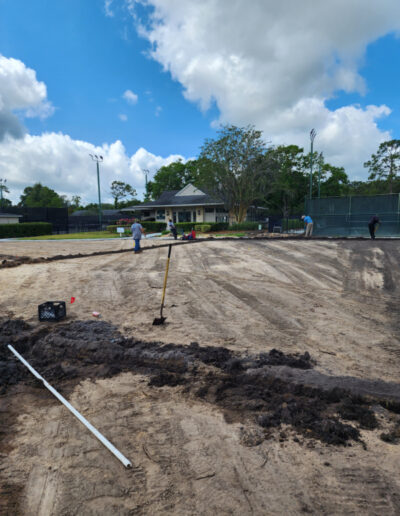Irrigation systems are essential for maintaining healthy landscapes and gardens, particularly in areas with inconsistent rainfall. Whether you're a homeowner looking to install an efficient watering system or a commercial property manager seeking reliable irrigation solutions, understanding the process of yard irrigation installation is crucial. This article will guide you through the details of yard sprinkler installation, discuss various sprinkler irrigation services, and provide insights into selecting the right professionals and companies for your needs.
Understanding the Process of Yard Irrigation Installation
When it comes to yard irrigation installation, there are several key components to consider. The process typically involves assessing your landscape's specific watering needs, choosing the right type of system—whether it's drip irrigation, sprinkler systems, or underground installations—and ensuring that your chosen method is both efficient and sustainable.
During initial consultations with sprinkler irrigation companies, they will evaluate factors like soil type, plant types, sun exposure, and existing landscaping features to determine the ideal system for your yard. Moreover, they may offer custom designs tailored to your unique requirements. The end goal is always to promote healthy growth while conserving water.
Types of Yard Irrigation Systems
Understanding the different types of yard irrigation systems can help you make an informed decision about what suits your needs best:
Sprinkler Systems: These are popular for their versatility and ease of use. They can be stationary or mobile, covering large areas effectively.
Drip Irrigation: Ideal for garden beds and potted plants, this system delivers water directly at the root zone, reducing waste.
Underground Systems: Often preferred for their aesthetic appeal, underground sprinkler systems remain hidden from view but deliver consistent coverage.
Smart Irrigation Systems: These advanced setups utilize weather data to optimize water usage efficiently.
Selecting the right type of system will heavily depend on your specific lawn dimensions and plant types. Consulting with local irrigation service companies can help clarify which option suits your unique landscape best.
Choosing Reliable Sprinkler Companies
Finding reputable yard sprinkler companies is critical for successful installation. Here are some tips on identifying the best professionals:
- Experience Matters: Look for companies that have been in business for several years as they tend to understand local climates and soil conditions better. Customer Reviews: Checking online reviews can provide insight into previous clients’ experiences with particular companies. Certifications: Companies like Rainbird have certified installers who undergo training to ensure high-quality service. Portfolio of Work: Ask potential contractors for examples of past work; a solid portfolio reflects their capabilities and expertise in residential irrigation services.
The Installation Process Explained
The installation process generally follows specific steps:
Site Assessment: A professional will evaluate your yard to determine its irrigation needs.
Design Phase: Detailed plans are drafted based on site assessment findings—this includes layout diagrams indicating where pipes and sprinkler heads will be installed.
Installation Preparation: The area may need some clearing or grading depending on existing conditions.

System Installation: This involves laying down pipes (for underground installations), installing sprinkler heads or drip lines, and connecting everything to a water supply.
System Testing: After installation is complete, a thorough test ensures everything is functioning correctly.
Final Adjustments & Maintenance Tips: Once tested, adjustments might be made based on observed performance.
Opting for professional assistance from trusted local contractors guarantees that you receive expert guidance throughout this process.
Costs Associated with Yard Irrigation Installation
The costs involved in installing an irrigation system can vary widely based on several factors:
- System Type: Underground systems often require more labor than above-ground sprinklers. Size of Your Yard: Larger spaces naturally require more materials and time. Complexity of Design: Customized designs may incur additional costs compared to standard setups.
To get precise estimates, consider reaching out to companies specializing in residential irrigation installation near you; obtaining multiple quotes helps ensure you find competitive pricing without compromising quality.
Maintaining Your Irrigation System
Once installed, regular maintenance is essential for keeping your yard's irrigation system operating efficiently:
Seasonal Check-Ups: Perform checks before each season changes; winterize systems if necessary during colder months.
Monitor Water Usage: Keep an eye on how much water your system uses—this can help identify leaks or inefficiencies quickly.
Regular Cleaning: Clean out any filters or heads that may become clogged over time due to dirt or debris buildup.
Adjust Settings: With changing seasons and plant growth patterns, readjust timers or settings occasionally.
By following these maintenance tips consistently over time, you'll extend the lifespan of your investment while ensuring optimal performance each watering season.
FAQs About Yard Irrigation Installation
1. What are common reasons homeowners choose yard sprinkler installation?
Homeowners often install sprinkler systems to automate watering schedules efficiently while conserving water usage compared to manual methods.
2. How long does it typically take to install an irrigation system?
Depending on complexity and size, installations usually range from one day up to a week but can vary based on contractor availability.
3. Can I install an irrigation system myself?
While irrigation installation DIY installations are possible for simpler setups like soaker hoses or above-ground sprinklers, professional assistance is recommended for complex or extensive layouts.
4. What should I look for when hiring lawn irrigation contractors?
Look for experience levels within local soil conditions familiarity paired with positive customer feedback regarding previous projects completed by them.
5. How do smart irrigation controllers work?
These innovative devices adjust watering schedules automatically based on real-time weather data—minimizing waste while promoting healthy growth patterns across landscapes effectively!
6. Are there grants available for installing efficient water systems?
Many cities offer incentives such as rebates when investing in water-saving technologies—check local websites dedicated toward conservation efforts!
Conclusion
Understanding the process of yard irrigation installation equips homeowners with valuable knowledge needed when considering such investments carefully! From recognizing different types available today through selecting reliable contractors down until maintaining systems afterwards—the journey becomes far less daunting once broken into manageable segments! By prioritizing professional assistance alongside ongoing evaluations over time—you'll ensure thriving landscapes while http://clear-water-irrigation-and-drainage-101.trexgame.net/the-benefits-of-underground-sprinkler-system-installation conserving vital resources effectively!